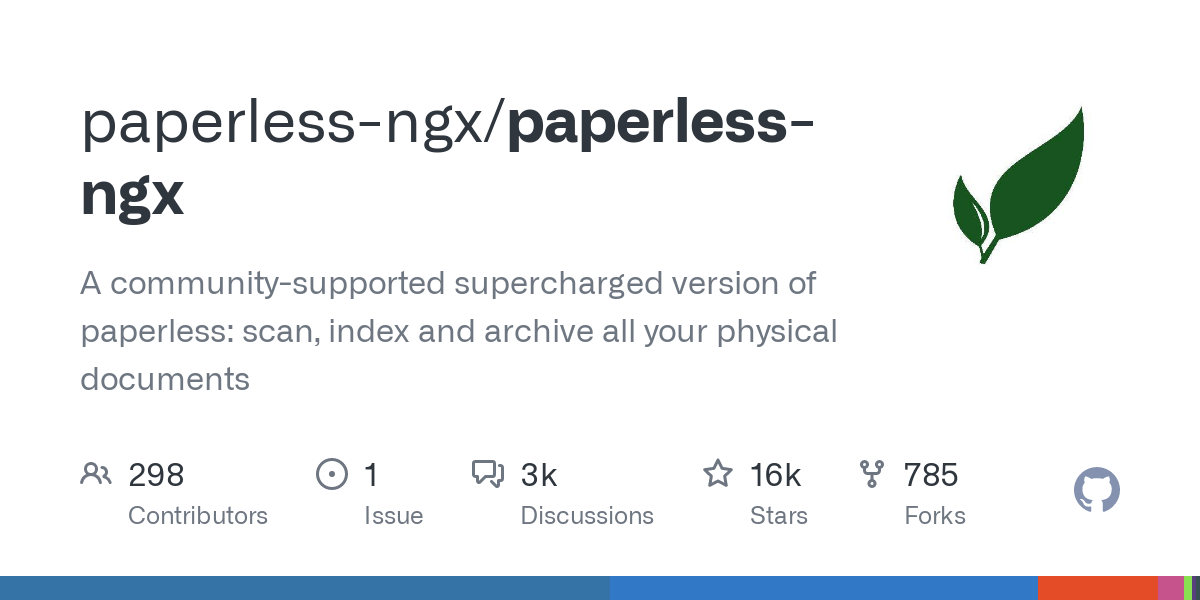Ha! I wrote it! Well the original anyway. It’s been forked a few times since I stepped away.
So yeah, I think it’s pretty cool 😆
Legend!
Do you use NGX yourself?
Actually, I stepped away from the project 'cause I stopped using it altogether. I started the project to satisfy the British government with their ridiculous requirements for proof of my relationship with my wife so I could live here. Once I was settled though and didn’t need to be able to bring up flight itineraries from 5 years ago, it stopped being something I needed.
Well that, and lemme tell you, maintaining a popular Free software project is HARD. Everyone has an idea of where stuff should go, but most of the contributions come in piecemeal, so you’re left mostly acting as the one trying to wrangle different styles and architectures into something cohesive… while you’re also holding down a day job. It was stressful to say the least, and with a kid on the way, something had to give.
But every once in a while I consider installing paperless-ngx just to see how it’s come along, and how much has changed. I’m absolutely delighted that it’s been running and growing in my absence, and from the screenshots alone, I see that a lot of the ideas people had when I was helming made it in in the end.
Oh wow! Quite a journey!
I’d consider Paperless a hall-of-famer for self-hosted software and something most people who get into self-hosting discover at some point, even if they don’t use it.
So thanks for building it, even if you’ve moved on. You gave the forkers something great to build from.
Hey man, that is what I used it for, but with the Belgian government! Great piece of software though!
It is honestly an awesone tool.
Thank you very much for the generously contributed code and time while working on it.The effort you put in, will live on for many years to come.
Aww! Thank you! It was fun ❤️
Just want to say thank you! Paperless is one of the first things I recommend to anyone considering self hosting their infra. Amazing piece of work!
Thanks! The crazy thing is that it’s really not that complicated. I’d say the hardest work was in writing the docs :-). It’s awesome to hear that people still use it and love it though.
Super good, it is increíble useful and the ability to find any document in almost any place in seconds in awesome.
Once this is said, you need to stick to a process and it is time consuming, and of course, you need to manually review the automatics tagging feature.
So, It is not a set and forget like most of the people expect
Slow and unreliable with sqlite, but rock solid and amazing with postgres.
Today, every document I receive goes into my duplex ADF scanner to scan to a network share which is monitored by Paperless. Documents there are ingested and pre-tagged, waiting for me to review them in the inbox. Unlike other posters here, I find the tagging process extremely fast and easy. Granted, I didn’t have to bring in thousands of documents to begin with but started from a clean slate.
What’s more, development is incredibly fast-moving and really useful features are added all the time.
Slow and unreliable with sqlite, but rock solid and amazing with postgres.
I haven’t noticed any major performance issues with sqlite. What tasks improved for you when you moved to postgres?
Page loading times, general stability. Everything, really.
I set it up with sqlite initially to test if it was for me, and was surprised how flaky it felt given how highly people spoke about it. I’m really glad I tried with postgres instead of just tearing it down. But my experience is highly anecdotal, of course.
Made my life a lot easier. No more looking for documents, all is in one place, fulltext search… Don’t ever want to go back
But most important: always have a backup ☝🏻
How do you run your backup for paperless? Just backup the document folder like you would anything else?
No just the data folder itself only contains the documents, but as file FILE00001.pdf
I do this with pg_dumpall and rclone. Once a day I export the database with pg_dumpall like this :
docker exec -i paperless pg_dumpall -c -U paperless > /backup/datenbank/homeserver-postgrescontainer-`date +%d.%m.%Y`.sqlAnd then I copy this file and the data folder encrypted to a secure cloud (Hetzner Storagebox)
More info
Does it do OCR? And can you create tags / naming convention / folders based on rules and text within the scanned document? I want to digitize all my paperwork, but there is so much I don’t have time to do the organizing part of it manually.
I believe it’s yes for all
Yes
I had a lot of false starts with having to upload and tag >3000 documents initially. Finally made the leap and did it in December. I now use it regularly, but am still getting used to the new dynamic, but that’s a transitional thing. Overall, enjoy it and look forward to more features!
The mobile app is a separate project, and is meant as a companion app rather than full fledged, which I understand. Though, it is still lacking.
Tried to use it, but I don’t want to move all of my data from my currently laid out folder/file structure into a docker container that I then need to backup/upgrade/feed/water/etc., especially when my grasp on docker containers is limited (at best) and I’m dealing with “production” data.
I wish the software worked like Immach; I could point it at a root folder and it would index everything with read only rights.
That, and I’m slightly worried that this iteration will stop being supported and it gets forked (again) which is great that it can be forked but I have no idea what would go into migrating data (see my limited docker knowledge from the first sentence).
Well you point the docker to some external data. You do never store the documents inside the docker. (Because it would get lost when it is updated)
It is comparable to the way Immich works.
Maybe I’m misunderstanding this, but their FAQ specifically says:
By default, your documents are stored inside the docker volume paperless_media. Docker manages this volume automatically for you.
It also says that documents are removed from the consumption directory, renamed, and put into a folder that you shouldn’t modify.
And that’s my problem with the project. I want to be able to keep my file name and organizational structure.
Have a look here: [https://github.com/paperless-ngx/paperless-ngx/blob/main/docker/compose/docker-compose.postgres.yml](paperless-ngx docker-compose.yml)
down under
webserver:you changedata:/usr/src/paperless/datato/path/to/where/you/wantorhave/your/files:/usr/src/paperless/data. Same for the media path and you’re done. paperless now uses a folder on your machine instead of a volume. If you want to be clean you will then also remove the volume declaration at the bottom of the file.i think OP wants it to leave their current files alone. But Paperless doesn’t work like that, it deletes the originals and arranges the files its own way.
Paperless does support defining a folder structure that you can use to organize documents within that paperless media volume however you should treat it as read only.
OP could use this as a way to keep their desired folder structure as much as possible, but it would have to be separate from the consumption folder.
I do want to leave my current files alone.
Ah OK, misunderstood that
It’s a docker volume. In this case it is managed by docker, but it is outside the container.
To have it save everything on your normal filesystem, it should be possible to just edit the docker compose file (I have not tried that)
Bind mounts. Always use bind mounts for data you care about, otherwise the “managed by docker” volumes are fated to be forgotten.
It won’t be your file structure as the file tree is managed by paperless, but at least using bind mounts you can easily navigate files and back them up independently or docker and paperless.
No idea what a bind mount is.
Is that supposed to be a line in the compose file?
yes, a bind mount / bind volume is when a volume is explicitly mapped to a location in your local storage rather than managed by docker and likely owned by root.
https://docs.docker.com/compose/compose-file/compose-file-v3/#volumes
Ok.
That’s over my head. I barely have a grasp on docker. And even then I’m paranoid that I’m screwing something up.
I’ve used it for a few months now and find it quite useful for storing and organizing my physical documents.
Paperless was my docker training program. I did so many mistakes and end up losing my database 3 times. My fourth try, runs smooth and I backup everything regularly. Actually 1.300 documents.
After indexing everything, I learned loving the archive feature. Docs I scanned, and don’t want to trash in real got a number in paperless and the same number in the paper folder.
I haven’t really configured a tagging system that makes any sense so it’s mostly used the search through documents through text. I’d like to figure out how to hook up a vector database to it to do really fuzzy searching
I’ve been using it since a couple of weeks. I barely use it, I uploaded a lot of documents. It is very time consuming to tag every uploaded old document. It works great! But batch commands are missing and the mobile app isn’t on par with the web version.
Moreover, OSS document scanner and pdf doc scan are great. I’d love to use paperless but I’m not sure if it’s the best solution right now.
You can do batch operations in a document view. Select multiple documents and change the attributes in the top menu. Which commands are you missing?
What scanners do people recommend?
Brother ADS-1700W is amazing!
- no PC or USB required: place it anywhere
- WiFi
- scans a page double-sided to PDF in two seconds!
- sends file to network share, ready to be consumed by Paperless
- fully automatic, no button presses needed!
- tiny footprint
- document feeder
- use with separator pages to bulk-scan many documents in one go
😍
I have this scanner and agree it works great, although there may be cheaper options out there that also work well.
FTP worked well out of the box. For SFTP on Arch Linux, I had to follow the troubleshooting instructions here: https://wiki.archlinux.org/title/Very_Secure_FTP_Daemon#LIST_command_resets_connection.
275€
Photos with my phone it is! Most documents I receive nowadays are digital anyway.
You are right, it’s not cheap. I delayed buying one for literally years but once I did, it was a game changer.
I’m in the same boat, but didn’t jump so yet. I’ve been following paperless for a while now but every time I look at scanners I’m blown away by their prices…
If you have an Android phone I can’t recommend Genius Scan enough. Fast, accurate, lots of features. I use it with syncthing by exporting the files to a folder that’s configured to sync the paperless input folder.
My family and I really like it. I invested in a small, physical scanner capable of network file sharing that we have plugged in and always ready to scan. When we get documents or receipts, we scan them and they’re immediately added to the database. I also have it checking an email address (mine is custom, but you could really have it check any address) and any time a PDF or such is sent, it gets consumed and that email them gets sorted.
There are a few downsides, however. As mentioned in other posts, turning your physical stack of documents into a digital stack of documents is just trading one pile for another. At least with a digital pile, you can sort a little quicker, but you still have to sort the consumed documents and check them to make sure the engine, which is supposed to be learning, has elected to sort the documents correctly.
The compose stack is pretty easy to use, but it does benefit from a little knowledge in Docker/containers. Especially when the main container decides it’s not healthy. I wouldn’t recommend it to a first time Docker user, is all.
Additionally and also previously mentioned, if you’re keeping important documents in it, encrypted storage with encrypted back up is important.
I currently have a love hate relationship with it, but that’s mostly because of issues outside of paperless. I had been uploading to my server automatically with Nextcloud, and processing the files with paperless as they came in. Next thing I know, all the files are gone and none of the documents are available in paperless any longer, just the OCR translations that… leave something to be desired sometimes.
I’ve scrapped the whole thing in the short term, and will likely try again in the long term. Just need to find the time.
Sounds like maybe you ran it as a container and didn’t mount the document archive externally then updated the container. That would have likely blown away the actual ingested documents but left the Metadata (including the OCR data) where it was, assuming the database was either its own container or mounted externally
Nah, the container had an external volume for storage. That’s one of the first things I checked.
Where did the docs go?
I believe the server purged them for space? Not really sure tbh.
I encountered such problem the moment when watchtower pulled the latest update, including postgres:16. After setting the docker compose file back to postgres:15.4 and updating the stack, all data reappeared.
This could have been it. At this point the data is fully lost though, as I killed the container completely.
Works great. Setup a month ago and imported over 600 documents, both digital and scanned. Makes backup a lot easier too as everything is in one place now.
















